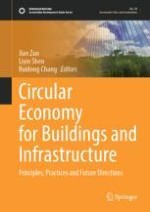2024 | OriginalPaper | Buchkapitel
9. Affordable Housing and Sustainable Communities in Sub-Saharan Africa: Implementation Drivers, Challenges and Practices
verfasst von : Nicholas Chileshe, Neema Kavishe
Erschienen in: Circular Economy for Buildings and Infrastructure
Aktivieren Sie unsere intelligente Suche, um passende Fachinhalte oder Patente zu finden.
Wählen Sie Textabschnitte aus um mit Künstlicher Intelligenz passenden Patente zu finden. powered by
Markieren Sie Textabschnitte, um KI-gestützt weitere passende Inhalte zu finden. powered by
